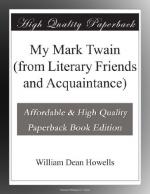Clemens was entirely satisfied with the result of the Civil War, and he was eager to have its facts and meanings brought out at once in history. He ridiculed the notion, held by many, that “it was not yet time” to philosophize the events of the great struggle; that we must “wait till its passions had cooled,” and “the clouds of strife had cleared away.” He maintained that the time would never come when we should see its motives and men and deeds more clearly, and that now, now, was the hour to ascertain them in lasting verity. Picturesquely and dramatically he portrayed the imbecility of deferring the inquiry at any point to the distance of future years when inevitably the facts would begin to put on fable.
He had powers of sarcasm and a relentless rancor in his contempt which those who knew him best appreciated most. The late Noah Brooks, who had been in California at the beginning of Clemens’s career, and had witnessed the effect of his ridicule before he had learned to temper it, once said to me that he would rather have any one else in the world down on him than Mark Twain. But as Clemens grew older he grew more merciful, not to the wrong, but to the men who were in it. The wrong was often the source of his wildest drolling. He considered it in such hopelessness of ever doing it justice that his despair broke in laughter.
X.
I go back to that house in Hartford, where I was so often a happy guest, with tenderness for each of its endearing aspects. Over the chimney in the library which had been cured of smoking by so much art and science, Clemens had written in perennial brass the words of Emerson, “The ornament of a house is the friends who frequent it,” and he gave his guests a welcome of the simplest and sweetest cordiality: but I must not go aside to them from my recollections of him, which will be of sufficient garrulity, if I give them as fully as I wish. The windows of the library looked northward from the hillside above which the house stood, and over the little valley with the stream in it, and they showed the leaves of the trees that almost brushed them as in a Claude Lorraine glass. To the eastward the dining-room opened amply, and to the south there was a wide hall, where the voices of friends made themselves heard as they entered without ceremony and answered his joyous hail. At the west was a little semicircular conservatory of a pattern invented by Mrs. Harriet Beecher Stowe,




